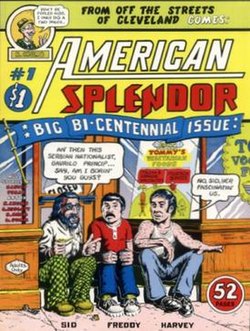| Number | Date of publication | Pages (including cover) | Artists | Publisher |
|---|
| 1 | May 1976 | 52 | Brian Bram, Greg Budgett, Robert Crumb, Gary Dumm, Lad Jeric | Harvey Pekar |
| 2 | April 1977 | 60 | Bram, Budgett, Crumb, Dumm | Harvey Pekar |
| 3 | 1978 | 56 | Budgett, Crumb, Dumm | Harvey Pekar |
| 4 | 1979 | 60 | Crumb, Dumm, Michael T. Gilbert, Gerry Shamray | Harvey Pekar |
| 5 | 1980 | 60 | Budgett, Crumb, Dumm, Shamray | Harvey Pekar |
| 6 | 1981 | 60 | Budgett, Dumm, Michael T. Gilbert, Shamray | Harvey Pekar |
| 7 | June 1982 | 60 | Kevin Brown, Budgett, Sean Carroll, Sue Cavey, Crumb, Rick Dahl, Dumm, Jack Millie, Shamray | Harvey Pekar |
| 8 | 1983 | 60 | Brown, Budgett, Cavey, Crumb, Dumm, Shamray | Harvey Pekar |
| 9 | 1984 | 60 | Carroll, Crumb, Dumm, Philip Fried, Barry Hoffman, Bill Knapp, Val Mayerik, May Midwest, Mitch Sonoda | Harvey Pekar |
| 10 | 1985 | 60 | Bill Crook, Dumm, Knapp, Mayerik, Sonoda, Joe Zabel | Harvey Pekar |
| 11 | 1986 | 60 | Joyce Brabner, Budgett, Dumm, Knapp, Mayerik, Spain Rodriguez, Ed Wesolowski, Zabel | Harvey Pekar |
| 12 | 1987 | 60 | Budgett, Gilbert Clark, Crumb, Dumm, Drew Friedman, Mayerik, Shamray, James Sherman, Spain, Frank Stack, Wesolowski, Zabel | Harvey Pekar |
| 13 | 1988 | 60 | Budgett, Dumm, Friedman, Rebecca Huntington, Paul Mavrides, Mayerik, Don Simpson, Stack, Wesolowski, Zabel | Harvey Pekar |
| 14 | 1989 | 60 | Alison Bechdel, Budgett, Stephen DeStefano, Dumm, Linda Dumm, William Fogg, Friedman, Huntington, Mavrides, Simpson, Stack, Wesolowski, Zabel | Harvey Pekar |
| 15 | 1990 | 60 | Chester Brown, Dumm, Knapp, Alan Moore, Carol Sobocinski, Spain, Stack, Richard G. Taylor, Wesolowski, Zabel, Mark Zingarelli | Harvey Pekar |
| 16 | Nov 1991 | 60 | Dumm, Sobocinski, Spain, Stack, Jim Woodring, Zabel | Harvey Pekar in association with Tundra Publishing |
| 17 | 1993 | 60 | Dumm, Mavrides, Joe Sacco, Shamray, Sobocinski, Stack, J. R. Stats, Alex Wald, Woodring, Zabel | Dark Horse Comics |
| (18) A Step Out of the Nest | Aug 1994 | 36 | Dumm, Zabel | Dark Horse |
| (19) Windfall 1 | Sep 1995 | 44 | Dumm, Josh Neufeld, Stack, Zabel | Dark Horse |
| (20) Windfall 2 | Oct 1995 | 44 | Dumm, Scott A. Gilbert, Neufeld, Sacco, Stack, Zabel | Dark Horse |
| (21) Comic-Con Comics | Aug 1996 | 28 | Dumm, Scott A. Gilbert, Neufeld, Zabel | Dark Horse |
| (22) On the Job | May 1997 | 28 | Dumm, Sacco, Stack, Zabel | Dark Horse |
| (23) Music Comics | Nov 1997 | 28 | Sacco | Dark Horse |
| (24) Odds and Ends | Dec 1997 | 28 | Dumm, Sam Hurt, Neufeld, Sacco, Shamray, Zabel | Dark Horse |
| (25) Transatlantic Comics | Jul 1998 | 28 | Stack, Colin Warneford | Dark Horse |
| (26) Terminal | Sep 1999 | 28 | Dumm, Sacco, Stack | Dark Horse |
| (27) Bedtime Stories | June 2000 | 28 | David Collier, Dean Haspiel, Neufeld, Sacco, Spain, Stack | Dark Horse |
| (28) Portrait of the Author in his Declining Years | Apr 2001 | 28 | Collier, Dumm, Haspiel, Neufeld, Sacco, Stack | Dark Horse |
| (29) Unsung Hero 1 | Aug 2002 | 28 | Collier | Dark Horse |
| (30) Unsung Hero 2 | Sep 2002 | 28 | Collier | Dark Horse |
| (31) Unsung Hero 3 | Oct 2002 | 28 | Collier | Dark Horse |
| (32) 1 | Nov 2006 | 36 | Hilary Barta, Budgett, Dumm, Glenn Fabry, Haspiel, Ty Templeton | Vertigo |
| (33) 2 | Dec 2006 | 36 | Eddie Campbell, Richard Corben, Haspiel, Leonardo Manco, Chris Samnee, Chris Weston, Chandler Wood | Vertigo |
| (34) 3 | Jan 2007 | 36 | Zachary Baldus, Budgett, Giuseppe Camuncoli, Dumm, Hunt Emerson, Rick Geary, Haspiel, Neufeld, Templeton, Steve Vance | Vertigo |
| (35) 4 | Feb 2007 | 36 | Ho Che Anderson, Baldus, Budgett, Dumm, Emerson, Bob Fingerman, Geary, Haspiel, Gilbert Hernandez | Vertigo |
| (36) Vol 2 1 | June 2008 | 36 | Baldus, Barta, Philip Bond, Haspiel, Mike Hawthorne, David Lapham, John Lucas, Ed Piskor, Weston | Vertigo |
| (37) Vol 2 2 | July 2008 | 36 | Baldus, Budgett, Dumm, Emerson, Haspiel, Lora Innes, Lapham, José Marzan Jr., Neufeld, Darick Robertson, Templeton | Vertigo |
| (38) Vol 2 3 | Aug 2008 | 36 | John Cebollero, Darwyn Cooke, Geary, Haspiel, Sean Murphy, Neufeld, Warren Pleece, Samnee | Vertigo |
| (39) Vol 2 4 | Sep 2008 | 36 | Budgett, Dumm, Geary, Haspiel, Robertson, Templeton | Vertigo |
